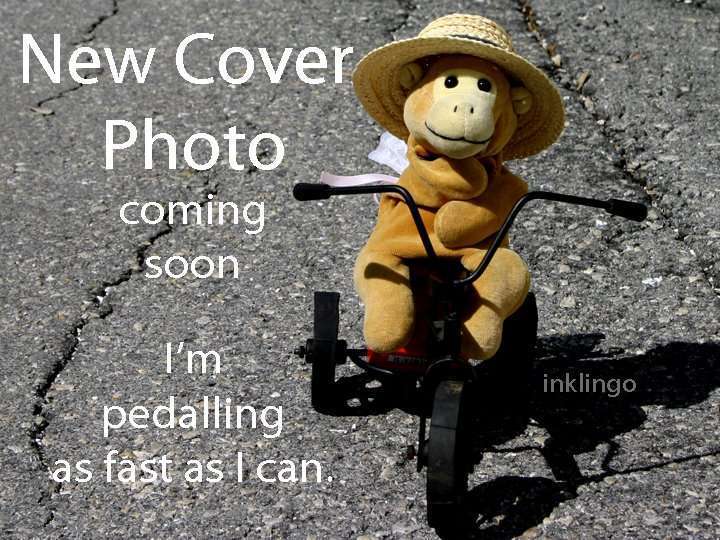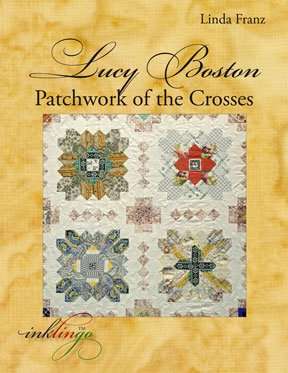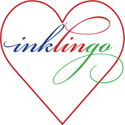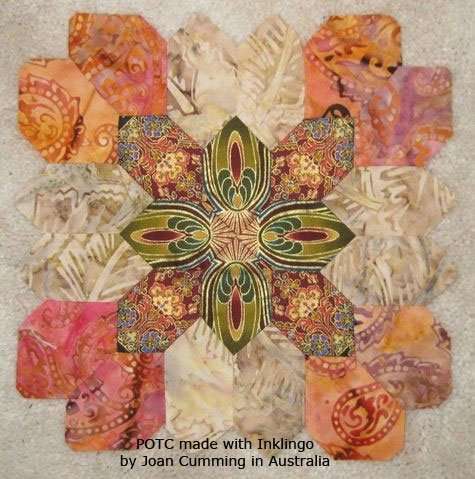
English Paper Piecing is the method that Lucy Boston used to make her Patchwork of the Crosses (POTC) and the other amazing quilts in The Patchworks of Lucy Boston by Diana Boston.
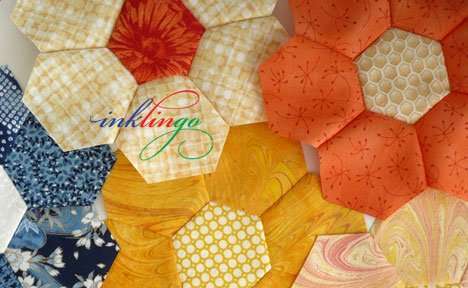
EPP is a traditional method for Grandmother’s Flower Garden too.
The more you know about EPP and Inklingo, the easier it is to choose the method that is best for you.
INKLINGO AND ENGLISH PAPER PIECING
With Inklingo and English Paper Piecing, you can make wonderful designs with hexagons, diamonds, triangles, shapes with curves (Clamshell, Apple Core, Dresden Plate), and many others. (Inklingo Index of Shapes)
There is inspiration in the Smart Shopper’s Idea Book (free download).
HOW TO ENGLISH PAPER PIECE – PART 2
In Wednesday Tute 15, we showed you how you can print the Inklingo layouts without seam allowances on template material to make your own perfect templates.
This time, we print the Inklingo layouts with seam allowances on the fabric.
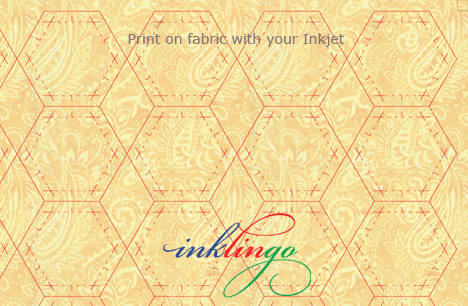
Printing the shapes on fabric is faster and easier than using an acrylic template and there is less fabric waste.
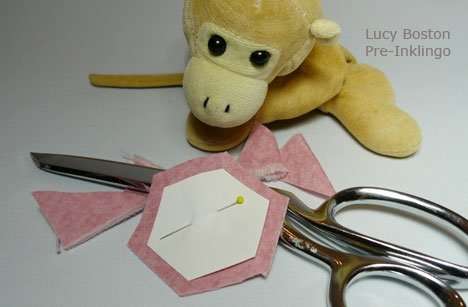
Lucy Boston cut the fabric with scissors, probably several layers at a time, adding the seam allowance by “rock of eye.” The seam allowances do not have to be exact because the template determines the finished size of the shape.
We often hear quilters say they need to live forever to finish all the quilts they want to make.
Lucy Boston lived to be 98, and was very creative in her old age. I cannot help but wonder how many more quilt masterpieces she could have created if she had had a rotary cutter, Inklingo and the variety of fabric we have today.
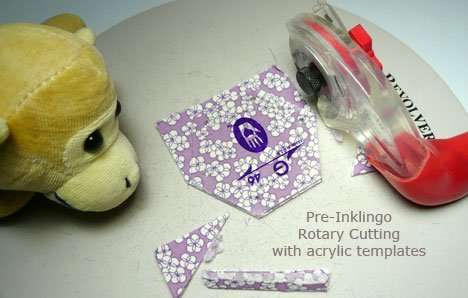
When the rotary cutter was introduced, quilters started using acrylic templates and rotating mats to cut several layers at a time.
Acrylic hexagons are available from many sources including Sue Daley’s Busy Fingers Patchwork in Australia and Marti Michell in Georgia and others. The seam allowances are included. A rotating mat is a nice idea if you are using acrylic templates. If you don’t have one, you can just turn a small mat.
If you cut from squares or rectangles (above), it wastes more fabric than cutting from strips.
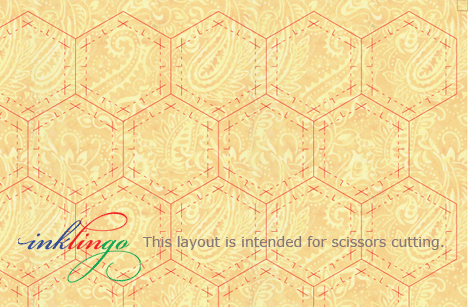
Now there is Inklingo, so you can print the shapes on fabric.
I include layouts for scissors cutting. It sometimes saves a little bit of fabric, but not much, so I usually rotary cut.
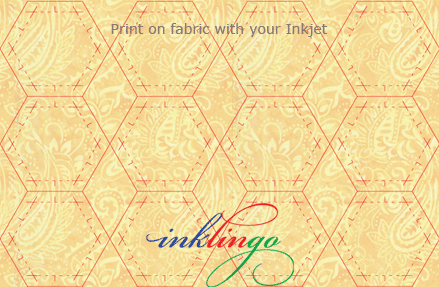
For EPP, we don’t need stitching lines, so I can print one sheet with this layout, layer with unprinted sheets (or even scraps) and rotary cut several layers at a time.
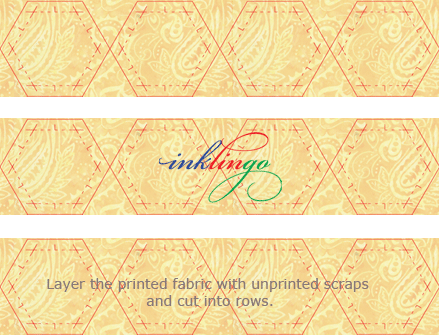
First, rotary cut rows of hexagons.

I recommend a fresh, sharp blade because it is safer and will allow you to cut through 5 or more layers at a time. It uses fabric very efficiently, especially compared to cutting shapes from fabric squares or rectangles.
This video was posted 4 years ago today, on the one year anniversary of the first downloadable shape collections in 2008.
In the video, all of the shapes are printed, but it shows how much easier and safer it is to cut with Inklingo and without acrylic templates.
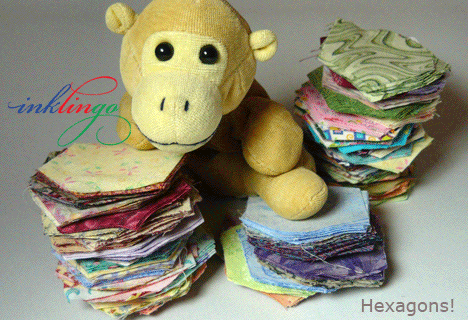
For EPP, you only need to print a few sheets of fabric to layer with unprinted sheets and rotary cut, but if you print all of the hexagons on fabric, the preparation is finished as soon as you cut—no basting!
If you print all of the shapes, you can start sewing immediately using a running stitch by hand (video) or by machine (video).
I find a running stitch to be more precise, faster and more portable, but if you prefer English Paper Piecing, the next step is basting—in our next tute!
There are illustrated instructions for English Paper Piecing in my POTC book too.

Inklingo quilters like Joan prefer to sew POTC with a running stitch by hand because it is more portable, more precise, and faster. However, Inklingo has advantages for quilters who enjoy whip-stitching and paper templates too.
In the next few Wednesday Tutes, we’ll look at more reasons to use Inklingo when you EPP!
- A choice of basting methods
- No-waste, faster Fussy Cutting
- Design Ideas like 300 Pieced Hexagons
- Sewing instructions and worksheets in the Inklingo Design Books
- English Paper Piecing Rescue
MORE WEDNESDAY TUTES
You can catch up on our other Wednesday Tutes now too:
- EIGHT Wednesday Tutes for Pieced Hexagons
- FIVE Wednesday Tutes for Double Wedding Ring
- ONE Wednesday Tute for Kaleidoscope Stars
- ONE Wednesday Tute for English Paper Piecing
Monkey and I would love it if you like the Inklingo FB page. Thank you!
ARE YOU SUBSCRIBED?
I hope you will subscribe to the blog (top of right side-bar), so you don’t miss more about English Paper Piecing in our next Wednesday Tutes!
Thanks for visiting. See you again soon!
Linda & Monkey
New to Inklingo? Order and download free shapes and start sewing in the next few minutes. Quick Start (Always FREE.) There are triangles, diamonds, and squares in the free collection—great for dozens of different blocks.
$10 Coupon! 7 Year Anniversary Special on the handbook

